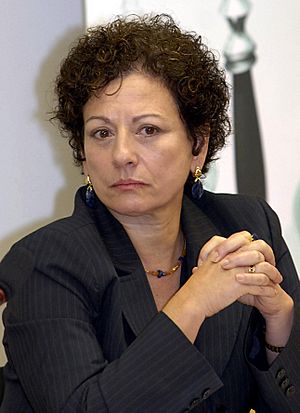Nilcéa Freire facts for kids
Nilcéa Freire (born September 14, 1953 – died December 28, 2019) was an important Brazilian scientist and politician. She started her career as a medical researcher and university teacher. Later, she moved into managing universities. She became the head of the Federal University of Rio de Janeiro. In 2004, she joined the government as a minister, working on policies for women. From 2005 to 2007, she led the Inter-American Commission of Women. After that, she worked for the Ford Foundation in Brazil, helping to create opportunities and fairness for groups who often don't get a fair chance.
Contents
Early Life and Education
Nilcéa Freire was born in September 1953 in Rio de Janeiro, Brazil. She started studying at the Federal University of Rio de Janeiro (UFRJ) in 1972. However, she had to stop her studies for two years (1975-1977). This was because she took part in student protests. During this time, she lived in Mexico. She returned to Brazil and finished her medical science degree in 1978.
After her medical training, Freire joined a Master's program. She studied tiny creatures called Schistosoma mansoni and other parasites. These parasites are common in Brazil and can make people sick. She finished her research in 1985. She spent a year studying at the National Natural History Museum in Paris as part of her studies.
Working for Change
In 1980, Nilcéa Freire began working at her old university, UFRJ. She taught about parasites and also did research. One of her most well-known research papers was about a disease called Esquistossomosi mansoni em Sumidouro.
University Leadership
From 1988, she started working in university management. She was in charge of graduate studies and research until 1991. In 1992, Freire studied university leadership in Canada. When she came back, she became the Director of Planning and Budget for UFRJ. She held this role from 1992 to 1995.
In 1996, she was chosen as the University Vice-Rector. In 1999, she became a dean. As dean, she started a new policy called affirmative action. This policy set aside places at UFRJ for Black students from low-income families and those who went to public schools. This helped more students get a chance to study. Between 2002 and 2004, she led the Education Council for the state of Rio de Janeiro.
Government and Women's Rights
In 1995, she joined the Partido dos Trabalhadores, a political party. On January 27, 2004, she became a government minister. She was named the Special Secretariat of Policies for Women. This happened during the time when Luiz Inácio Lula da Silva was president.
In July 2004, she organized the First National Conference on Policies for Women. More than 120,000 women from all over Brazil attended this big meeting. Based on the ideas from this conference, a National Plan of Policies for Women was created. This plan focused on ways to improve life for women. From 2005 to 2007, she was the President of the Inter-American Commission of Women. Here, she worked on international agreements for fairness between men and women. The Second National Conference on Policies for Women was held in 2007. This time, it also included refugee women in the discussions.
Helping Communities
After her time in government ended in 2010, Freire joined the Ford Foundation in 2011. She became their representative in Rio de Janeiro. She managed the foundation's work in Brazil. Her goal was to create more opportunities and justice for groups who were often left out. This included Afro-Brazilians and indigenous peoples.
Later Life
Nilcéa Freire passed away on December 28, 2019, in Rio de Janeiro.
See also
 In Spanish: Nilcéa Freire para niños
In Spanish: Nilcéa Freire para niños
 | Roy Wilkins |
 | John Lewis |
 | Linda Carol Brown |


